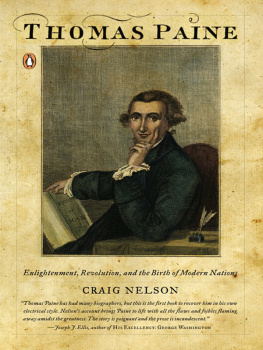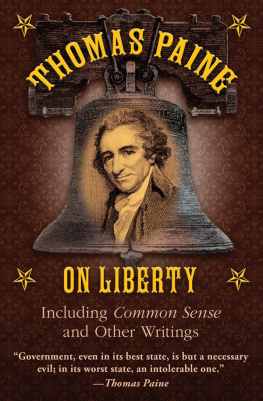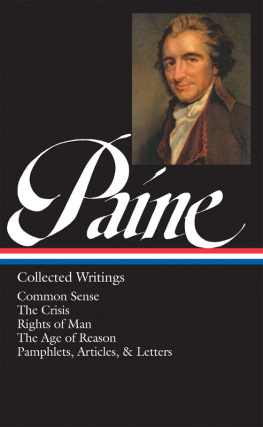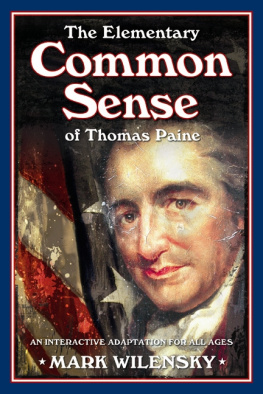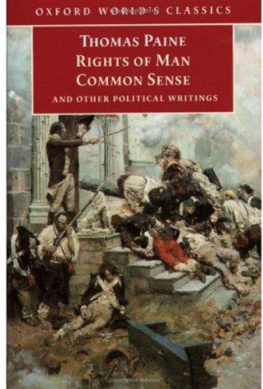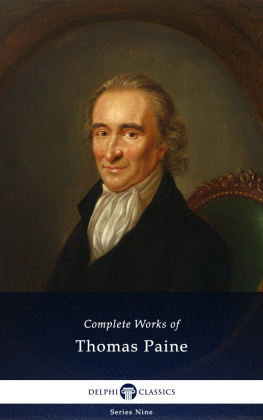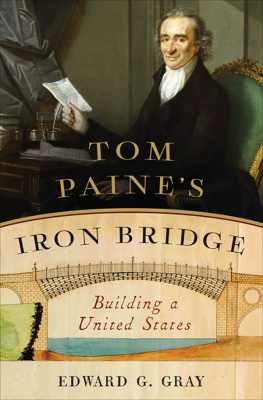Craig Nelson is the author of four previous books, including The First Heroes and Lets Get Lost . His writings have appeared in Salon , the New England Review , Blender , Genre , and a host of other publications. He was an editor at HarperCollins, Hyperion, and Random House for almost twenty years and has been profiled by Variety , Interview , Manhattan, Inc. , and Time Out . He lives in Greenwich Village.
THOMAS PAINE
Enlightenment, Revolution,
and the Birth of Modern Nations
Craig Nelson

PENGUIN BOOKS
PENGUIN BOOKS
Published by the Penguin Group
Penguin Group (USA) Inc., 375 Hudson Street, New York, New York 10014, U.S.A.
Penguin Group (Canada), 90 Eglinton Avenue East, Suite 700, Toronto,
Ontario, Canada M4P 2Y3 (a division of Pearson Penguin Canada Inc.)
Penguin Books Ltd, 80 Strand, London WC2R 0RL, England
Penguin Ireland, 25 St Stephens Green, Dublin 2, Ireland (a division of Penguin Books Ltd)
Penguin Group (Australia), 250 Camberwell Road, Camberwell,
Victoria 3124, Australia (a division of Pearson Australia Group Pty Ltd) Penguin Books India Pvt Ltd, 11 Community Centre, Panchsheel Park, New Delhi110 017, India
Penguin Group (NZ), 67 Apollo Drive, Rosedale, North Shore 0745,
Auckland, New Zealand (a division of Pearson New Zealand Ltd)
Penguin Books (South Africa) (Pty) Ltd, 24 Sturdee Avenue, Rosebank,
Johannesburg 2196, South Africa
Penguin Books Ltd, Registered Offices:
80 Strand, London WC2R 0RL, England
First published in the United States of America by Viking Penguin,
a member of Penguin Group (USA) Inc. 2006
Published in Penguin Books 2007
Copyright The Craig Nelson Company, Inc., 2006
All rights reserved
ISBN: 978-1-1012-0178-7
CIP data available
The scanning, uploading and distribution of this book via the Internet or via any other means without the permission of the publisher is illegal and punishable by law. Please purchase only authorized electronic editions, and do not participate in or encourage electronic piracy of copyrighted materials. Your support of the authors rights is appreciated.
For Rick
Not to have knowledge of what happened before you were born is to be condemned to live forever as a child.
CICERO
The penalty good men pay for not being interested in politics is to be governed by men worse than themselves.
PLATO
There have been so many writers who dominated a period and then slipped off. History is like some gigantic beastit simply wriggles its back and throws off whatever is on it.
ARTHUR MILLER
A Note
Writers of the eighteenth century did not believe that consistency in spelling, capitalization, punctuation, or italics was a mark of literacy. I have used modern versions of their work so that todays reader will not imagine them fusty, old-fashioned, or poorly educated, opinions that would have horrified them. The American founding fathers, British progressives, and French revolutionaries who are the subjects of this book, after all, considered themselves a forward-thinking global avant-garde, absolutely modern, who believed with all their hearts that they had in their power to begin the world over again.
As we now know, this is exactly what they did.
Acknowledgments
Anyone who writes history depends, in great measure, on the kindness of librarians, and the key figures in the world of Paine scholarship have been remarkably kind, gracious, and professional toward me:
Valerie-Anne Lutz, J. J. Ahern, Roy Goodman, and Elaine Delduca, the Library of the American Philosophical Society, Philadelphia; Bruce Kirby, Manuscript Division, the Library of Congress, Washington, D.C.; Jean Archdeacon and Janet Broughton, Ambrose Barker Paine Collection, Norfolk County Council Library, Thetford; Esme Evans and Ann Mills, the Sussex Archaeological Society Library, Lewes; Andrew Lusted and Anne Hart, the East Sussex Records Office, Lewes.
I owe a great deal of thanks to the women who helped extensively with research in France: Mona Ghuneim, for her reconnoitering with the Institut dHistoire de la Rvolution Franaise, Universit de Paris, and Katharine Coit, for her investigations at the Bibliothque Nationale and the Ministre des Affaires Etrangres.
Im grateful for my big-hearted and hardheaded agent, Stuart Krichevsky; for my dazzling American editor, Rick Kot;
fr meinen grossen Schatz, Dan Golden.
1. The Mission of Atonement
JUST BEFORE DAYBREAK on or about September 25 in the year 1819, a fifty-six-year-old Englishman by the name of William Cobbett found himself twenty-two miles due north of New York City, stumbling pink-faced and ardent through the wild blackness of Westchester, followed by his son, J.P., and a hired hand. The night was dank and blind and crowded with the raucous blur of a thousand unseen creatures, for though the myriad flocks and herds of the New World would in time be annihilated for their fur, their meat, and the carnal pleasure of taking a life, at that moment the continent was as awash in wildlife as an African dreambald eagles nested along the Manhattan riverbanks, and catamounts prowled the outskirts of Greenwich Village. As Cobbett and his men scurried forward into the darkness, they found themselves engulfed by the moans of frogs, the rasps of crickets, the pierce of owls, the bark of foxes, the mourning of wolves.
Burdened by a large box and an assortment of picks and shovels, the men made their way across the border of the French Protestant refuge of New Rochelle, hindered by using as few torches as possible in order to travel unnoticed. Even so, at the nearby tavern owned by Charity Badeau, her son, Albert, heard the men in the dead of night and alerted the authorities. Now Cobbett and his men could hear a group of local magistrates in the distance, approaching.
They hurried along as well as could be managed, helped by their leaders knowing exactly where his quarry lay, having traced the route numerous times before in daylight hours. Finally he and his men arrived at their destination and hurriedly began to dig.
Even taking into account that eras Renaissance style of gentlemanly pursuitsexemplified by printer, natural philosopher, essayist, businessman, inventor, civil servant, and diplomat Benjamin FranklinWilliam Cobbett had pursued a significant range of trades over the course of one lifetime. Soldier, publisher, Tory, radical, Commons deputy, essayist, and Long Island farmer (who loathed the potato but championed the rutabaga), he is primarily known today for Rural Rides, an ode to bucolic Albion:

